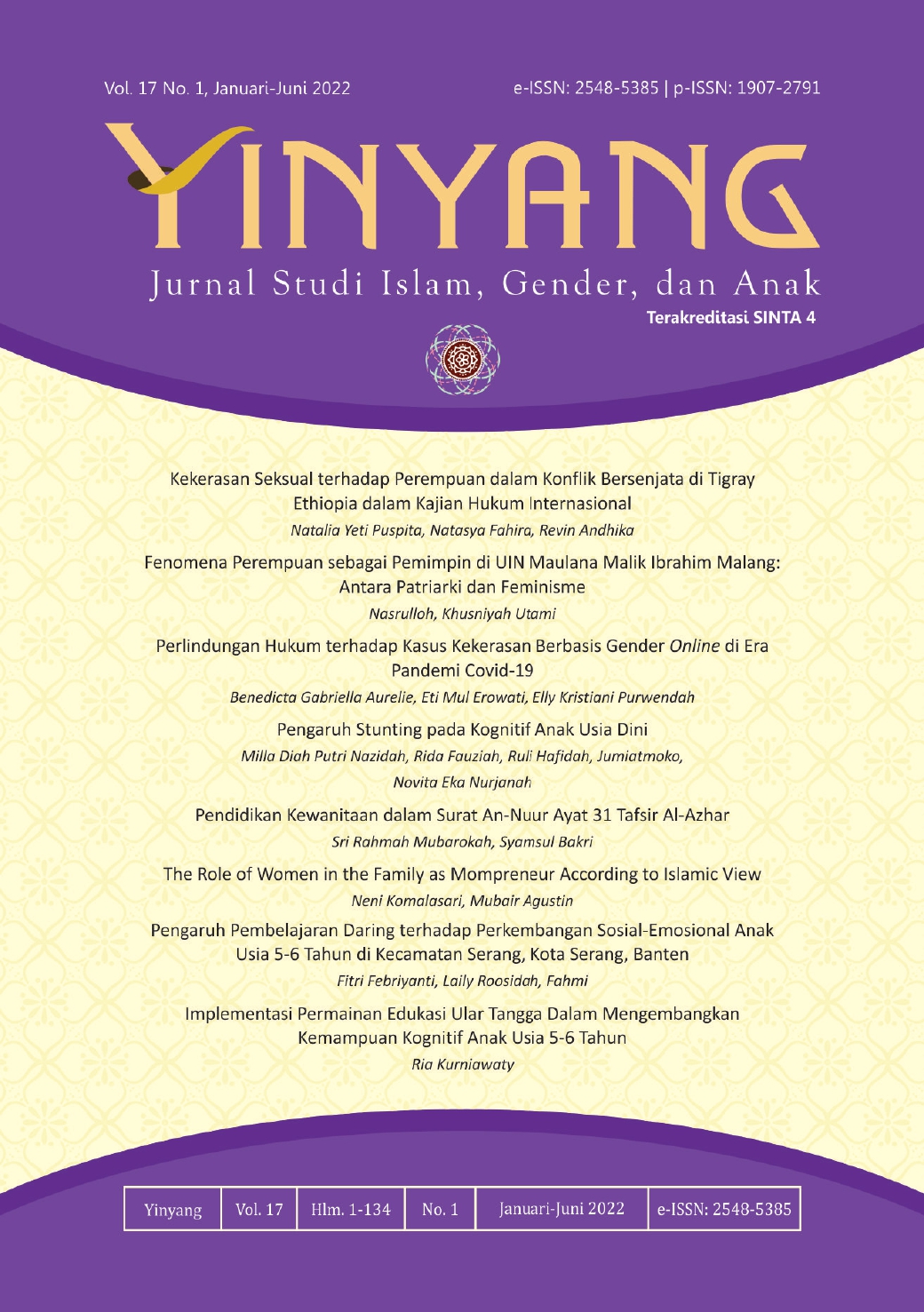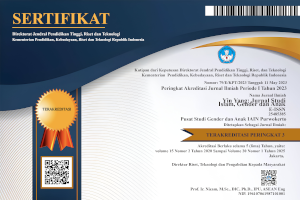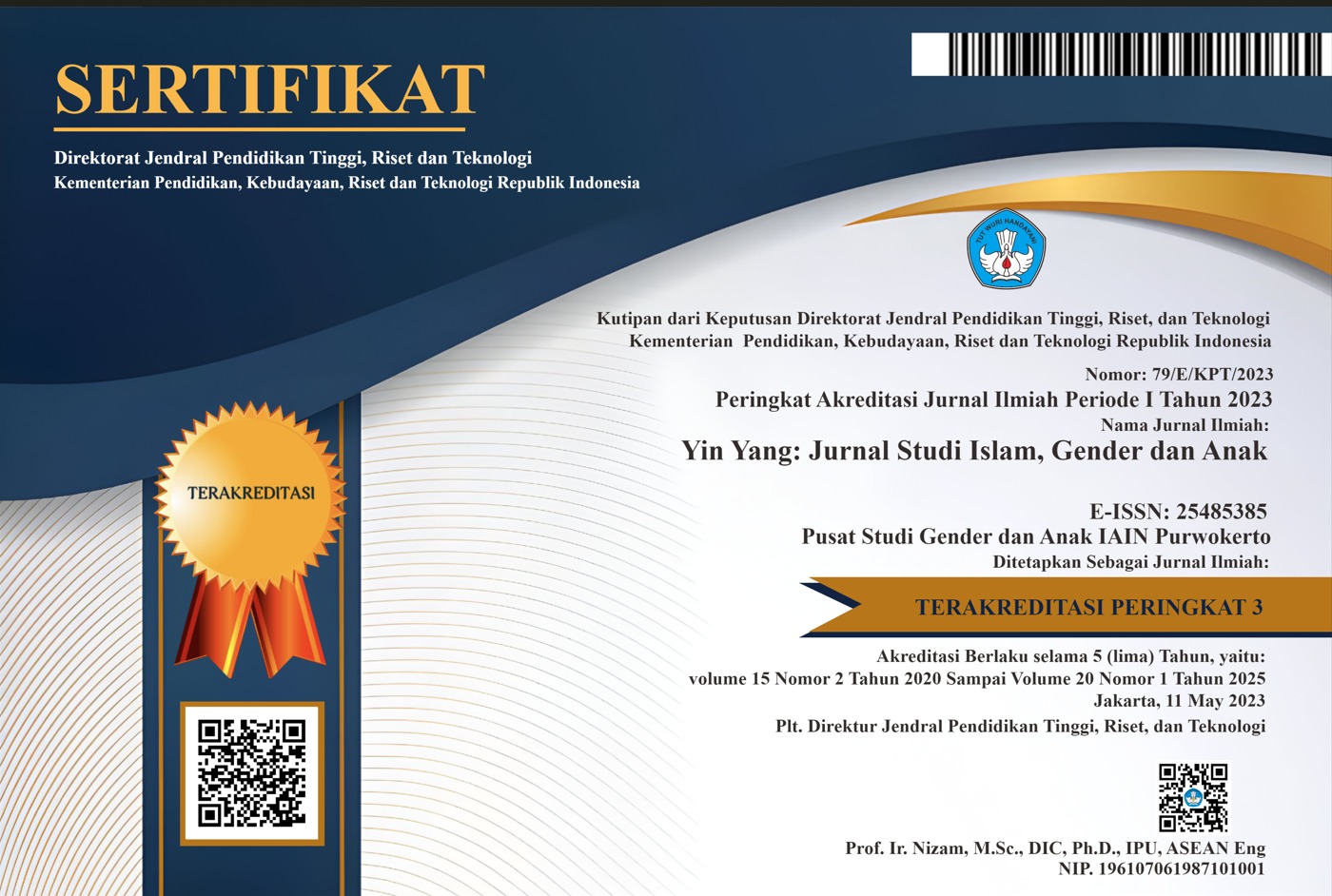Fenomena Perempuan sebagai Pemimpin di UIN Maulana Malik Ibrahim Malang: Antara Patriarki dan Feminisme
DOI:
https://doi.org/10.24090/yinyang.v17i1.5196Keywords:
Women Leaders, Patriarchy, FeminismAbstract
At the State Islamic University (UIN) Maulana Malik Ibrahim Malang, there are many female faculty and department leaders. Basically, at this time it is not impossible for a woman to become a leader, with the development of feminism in society, women's leadership is not a rare thing. However, the ability of women to occupy the highest positions as leaders who supervise men is still a matter of debate. Patriarchal ideology doubts the position of women as leaders and assumes that not all leadership positions can be occupied by women. This study aims to explain the legal rights of women as leaders with certain limitations. This research is descriptive qualitative, where the researcher will analyze the data gradually after going into the field to make observations through interviews with women who occupy leadership and non-leader positions at UIN Maulana Malik Ibrahim Malang. The results of the interviews were then supported by literature studies from books and scientific research to obtain research results. The method used in this research is qualitative with an inductive approach, because it requires in-depth analysis to find the law of the problems that are carried out in this study. Based on the data obtained, it can be found that the law of women as leaders is permissible and the assumption that women are the weak is not much different from the views of the ignorant society in the past. Therefore, if a woman has good qualities and a capable leadership spirit, then there is no prohibition for her to occupy a leadership position.Downloads
Download data is not yet available.
References
Abarizan. (2012). Wanita, Politik dan Hukum. Pekanbaru: LPP UIN Suska.
Abror. Mhd. (2020). Kepemimpinan Perempuan Perspektif Hukum Islam. TERAJU: Jurnal Syariah dan Hukum. Vol. 02. No. 01.
Agesna, Widya. (2018). Kedudukan Pemimpin Perempuan Dalam Hukum Islam. AL-IMARAH: Jurnal Pemerintahan dan Politik Islam. Vol. 3. No. 1.
Al-Bukhary, Muhammad Abu Fida’, Ismail. (1960). Al-Jami’ Al-Sahih Al-Mukhtasar. Tahqiq. Mustafa al-Bugha. IV.
Al-Dahlawi, Syah Waliyyullah. (1992). Hujjatullah al-Balighah. Bairut: Dar al-Ma’rifah. Juz 2.
Al-Jauzi, Abu al-Faraj. (1996). Kasyfu al-Musykil min Hadish al-Shalihain. Tahqiq: Ali Husain al-Bawwab. Riyadh: Dar al-Watan. Juz I.
Al- Mawardi. (2012). Al-Ahkam as-Sulthaniyah. Bekasi: Teraju.
Al-Qardhawi, Yusuf. (1997). Fikih Negara. Jakarta: Rabbani Press.
Al-Syaukani, Muhammad Ibn Ali. (2005). Nailul Awtar. Tahqiq: Islam al-Din al-Sababaty. Mesir: Dar al-Hadis.
Al-Zuhaili, Wahbah. (1418). Tafsir Munir. Bairut: Dar al-Fikr.
Anggito, Albi dan Johan Setiawan. (2018). Metodologi Penelitian Kualitatif. Sukabumi CV: Jejak.
Asmani, Jamal Ma’mur. (2015). Kepemimpinan Perempuan: Pergulatan Wacana di Nahdhatul Ulama (NU). Jurnal Addin: Staimafa, Jawa Tengah. Vol. 9. No. 1.
Farida. (2018). Kepemimpinan Perempuan Dalam Al-Quran. Jurnal Ilmu Al-Quran dan Tafsir: UIN Raden Intan Lampung.
Hannam, June. (2013). Feminism. Taylor and Francis.
Hamka. Husein. (2013). Kepemimpinan Perempuan Dalam Era Modern. Jurnal Al-Qalam. Vol. 19. No. 1.
Katijasungkana, Nursyahbani. (2008). Perempuan dan Syariah Islam Dalam Konteks Sistem Hukum Indonesia.
Ma’ani, Achmad Syafi’i. (2013). Agama Politik Moral. Malang: Anggota IKPI.
Mies, Marla. (1986). Patriarchy and Accumulation on a World Scale: Women in the International Division of Labour. Avon The Bath Press, h. 37.
Muhajir. (2018). Kepemimpinan Perempuan Dalam Islam. Jurnal Al-Qadha. Vol. 5. No. 2.
Nanang, Martono. (2014). Metode Penelitian Kualitatif Edisi Revisi. Jakarta: Raja Grafindo Persada.
Pahlawan Kayo, Khatib. (2005). Kepemimpinan Islam dan Dakwah. Jakarta: Sinar Grafika Offset.
Purhantara, Wahyu. (2010). Metode Penelitian. Yogyakarta: Graha Ilmu.
Rohmatullah, Yuminah. (2017). Kepemimpinan Perempuan Dalam Islam: Melacak Sejarah Feminisme Melalui Pendekatan Hadist. Jurnal Syariah: Jurnal Ilmu Hukum dan Pemikiran. Vol. 17. No. 1.
Shihab, Quraish. (2017). Tafsir al-Misbah: Pesan, Kesan dan Keserasian al-Qur’an. Jakarta: Lentera Hati.
Sugiyono. (2017). Metode Penelitian Kuantatif, Kualitatif, dan R&D. Bandung: Alfabeta.
Suharsimi, Arikunto. (2007). Prosedur Penelitian. Jakarta: Rineka Cipta.
Suryadilaga, M. Al-Fatih. (2005). Metodologi Ilmu Tafsir. Yogyakarta: Teras.
Soebardhy, dkk. (2020). Kapita Selekta Metodologi Penelitian. Pasuruan: CV Penerbit Qiara Media.
Tarjo. (2019). Metode Penelitian 3x Baca. Yogyakarta: Deepublish.
Walby, Sylvia. (1998). Theorizing Patriarchy, Oxford: Blackwell.
Zahra, Essa Fatimah. (2020). Kepemimpinan Perempuan Di Balik Bayang-Bayang Patriarki. International Jurnal Of Demos. Vol. 2. Issue. 1.
Abror. Mhd. (2020). Kepemimpinan Perempuan Perspektif Hukum Islam. TERAJU: Jurnal Syariah dan Hukum. Vol. 02. No. 01.
Agesna, Widya. (2018). Kedudukan Pemimpin Perempuan Dalam Hukum Islam. AL-IMARAH: Jurnal Pemerintahan dan Politik Islam. Vol. 3. No. 1.
Al-Bukhary, Muhammad Abu Fida’, Ismail. (1960). Al-Jami’ Al-Sahih Al-Mukhtasar. Tahqiq. Mustafa al-Bugha. IV.
Al-Dahlawi, Syah Waliyyullah. (1992). Hujjatullah al-Balighah. Bairut: Dar al-Ma’rifah. Juz 2.
Al-Jauzi, Abu al-Faraj. (1996). Kasyfu al-Musykil min Hadish al-Shalihain. Tahqiq: Ali Husain al-Bawwab. Riyadh: Dar al-Watan. Juz I.
Al- Mawardi. (2012). Al-Ahkam as-Sulthaniyah. Bekasi: Teraju.
Al-Qardhawi, Yusuf. (1997). Fikih Negara. Jakarta: Rabbani Press.
Al-Syaukani, Muhammad Ibn Ali. (2005). Nailul Awtar. Tahqiq: Islam al-Din al-Sababaty. Mesir: Dar al-Hadis.
Al-Zuhaili, Wahbah. (1418). Tafsir Munir. Bairut: Dar al-Fikr.
Anggito, Albi dan Johan Setiawan. (2018). Metodologi Penelitian Kualitatif. Sukabumi CV: Jejak.
Asmani, Jamal Ma’mur. (2015). Kepemimpinan Perempuan: Pergulatan Wacana di Nahdhatul Ulama (NU). Jurnal Addin: Staimafa, Jawa Tengah. Vol. 9. No. 1.
Farida. (2018). Kepemimpinan Perempuan Dalam Al-Quran. Jurnal Ilmu Al-Quran dan Tafsir: UIN Raden Intan Lampung.
Hannam, June. (2013). Feminism. Taylor and Francis.
Hamka. Husein. (2013). Kepemimpinan Perempuan Dalam Era Modern. Jurnal Al-Qalam. Vol. 19. No. 1.
Katijasungkana, Nursyahbani. (2008). Perempuan dan Syariah Islam Dalam Konteks Sistem Hukum Indonesia.
Ma’ani, Achmad Syafi’i. (2013). Agama Politik Moral. Malang: Anggota IKPI.
Mies, Marla. (1986). Patriarchy and Accumulation on a World Scale: Women in the International Division of Labour. Avon The Bath Press, h. 37.
Muhajir. (2018). Kepemimpinan Perempuan Dalam Islam. Jurnal Al-Qadha. Vol. 5. No. 2.
Nanang, Martono. (2014). Metode Penelitian Kualitatif Edisi Revisi. Jakarta: Raja Grafindo Persada.
Pahlawan Kayo, Khatib. (2005). Kepemimpinan Islam dan Dakwah. Jakarta: Sinar Grafika Offset.
Purhantara, Wahyu. (2010). Metode Penelitian. Yogyakarta: Graha Ilmu.
Rohmatullah, Yuminah. (2017). Kepemimpinan Perempuan Dalam Islam: Melacak Sejarah Feminisme Melalui Pendekatan Hadist. Jurnal Syariah: Jurnal Ilmu Hukum dan Pemikiran. Vol. 17. No. 1.
Shihab, Quraish. (2017). Tafsir al-Misbah: Pesan, Kesan dan Keserasian al-Qur’an. Jakarta: Lentera Hati.
Sugiyono. (2017). Metode Penelitian Kuantatif, Kualitatif, dan R&D. Bandung: Alfabeta.
Suharsimi, Arikunto. (2007). Prosedur Penelitian. Jakarta: Rineka Cipta.
Suryadilaga, M. Al-Fatih. (2005). Metodologi Ilmu Tafsir. Yogyakarta: Teras.
Soebardhy, dkk. (2020). Kapita Selekta Metodologi Penelitian. Pasuruan: CV Penerbit Qiara Media.
Tarjo. (2019). Metode Penelitian 3x Baca. Yogyakarta: Deepublish.
Walby, Sylvia. (1998). Theorizing Patriarchy, Oxford: Blackwell.
Zahra, Essa Fatimah. (2020). Kepemimpinan Perempuan Di Balik Bayang-Bayang Patriarki. International Jurnal Of Demos. Vol. 2. Issue. 1.
Downloads
Published
2022-06-28
How to Cite
Nasrulloh, N., & Utami, K. (2022). Fenomena Perempuan sebagai Pemimpin di UIN Maulana Malik Ibrahim Malang: Antara Patriarki dan Feminisme. Yinyang: Jurnal Studi Islam Gender Dan Anak, 17(1), 19–34. https://doi.org/10.24090/yinyang.v17i1.5196
Issue
Section
Articles
License
Authors who publish with this journal agree to the following terms: Authors retain copyright and grant the journal right of first publication with the work simultaneously licensed under a Creative Commons Attribution-ShareAlike 4.0 International License that allows others to share the work with an acknowledgment of the work's authorship and initial publication in this journal.


















